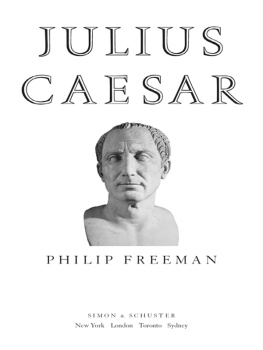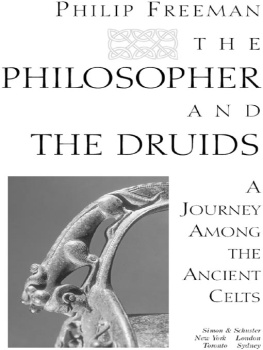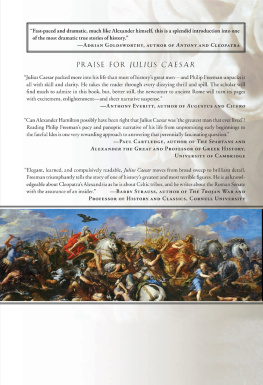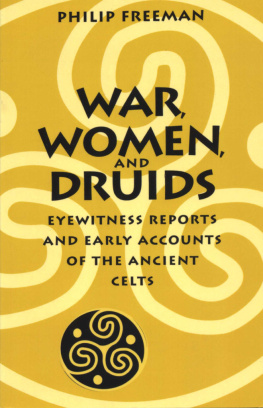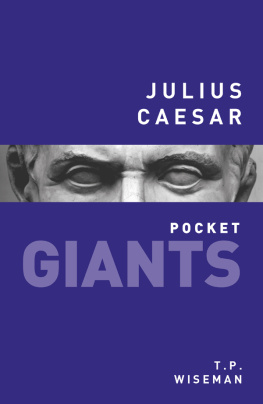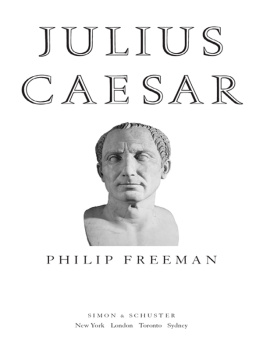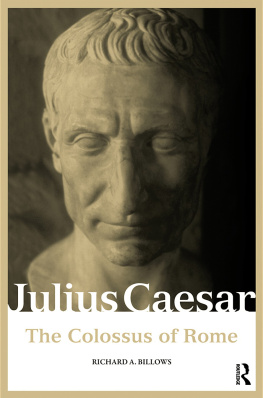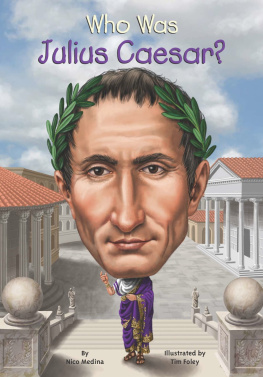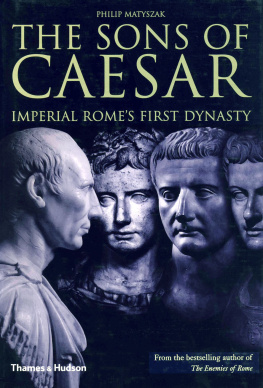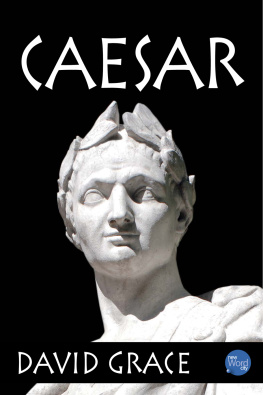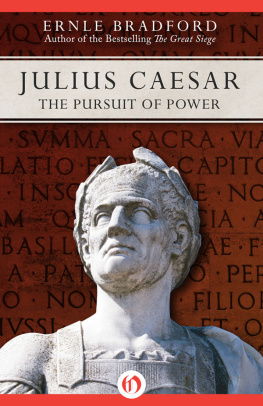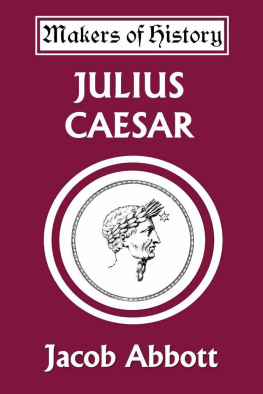ALSO BY PHILIP FREEMAN
The Philosopher and the Druids:
A Journey Among the Ancient Celts
St. Patrick of Ireland: A Biography
War, Women, and Druids: Eyewitness Reports
and Early Accounts of the Ancient Celts
The Galatian Language: A Comprehensive Survey of the Language
of the Ancient Celts in Greco-Roman Asia Minor
Ireland and the Classical World

S IMON & S CHUSTER
1230 Avenue of the Americas
New York, NY 10020
Copyright 2008 by Philip Freeman
All rights reserved, including the right to reproduce this book or
portions thereof in any form whatsoever.
For information address Simon & Schuster Subsidiary Rights Department,
1230 Avenue of the Americas, New York, NY 10020
S IMON & S CHUSTER and colophon are registered trademarks of Simon & Schuster, Inc.
Library of Congress Cataloging-in-Publication Data
Freeman, Philip, 1961
Julius Caesar / Philip Freeman.
p. cm.
Includes bibliographical references and index.
1. Caesar, Julius. 2. GeneralsRomeBiography. 3. Heads of stateRomeBiography. 4. RomeHistoryRepublic, 26530 B.C. I. Title.
DG261.F784 2008
937.05092dc22
[B]
2007034482
ISBN-13: 978-1-4165-6588-8
ISBN-10: 1-4165-6588-4
Visit us on the World Wide Web:
http://www.SimonSays.com
JULIUS CAESAR
PREFACE
O ne day not long ago I was standing in front of my Latin class, lecturing on the correct formation of imperfect verbs. It was a beautiful fall day on campus, the kind that practically begs college students to toss a Frisbee around the grassy quad in front of the library. I was nearing the end of the hour and rapidly losing my audience as their eyes drifted to the idyllic scene outside the classroom windows. So I decided to postpone grammar and take a detour into Roman history.
Okay, I asked, whos heard of Julius Caesar? Everyone in the class raised their hands. All right then, I continued, what can you tell me about him?
A long silence followed, then one young woman offered, He was stabbed to death wasnt he? I remember reading about it in a Shakespeare play back in high school.
Excellent, I said, but does anyone know when his murder occurred?
They carefully studied their desk tops until one student looked up and said, Wait, it was the Ides of March!
Good, good, I responded, always eager to encourage class participation. He was killed by a group of Roman senators in Pompeys theater on the Ides of March, which is of course March 15. Now can anyone tell me something else about his life?
Silence again. Then a student in back asked, Wasnt he an epileptic? And he was born by caesarean section, right?
Partly right, I said. He did have epilepsy, but the caesarean story is a myth.
I then devoted the last five minutes of class to filling them in on a few little-known facts about Julius Caesar. I told them how he was born into a poor but noble family; how he was ordered by the dictator Sulla to divorce the wife he loved, but refused, even though it meant a death sentence; how he was kidnapped by pirates as a young man; how he rose to power and became a great lawyer, politician, general, engineer, historian, and high priest of Rome; and finally, how he invented the calendar we still use today.
Class time was over and the students began heading out the door into the sunshine. I erased the board and collected my papers, then heard one of my students in the hallway say to a friend, Man, that was amazingI didnt know Caesar did all that stuff. It was one of those moments professors live for, when we realize a student is actually excited about learning something new. As I shuffled back to my office to grade a stack of waiting papers, I wondered how many people really know the true story of Caesar.
Julius Caesar was one of the greatest heroes of human historyor one of its most pernicious villains, depending on whom you believe. The medieval poet Dante assigned him a blessed afterlife among the most virtuous pagans while sentencing his two leading murderers, Brutus and Cassius, to the lowest level of hell. Mark Twain wrote that Caesar waged wars against barbarians not because they had done him any harm, but because he wanted their land, and desired to confer the blessings of civilization upon their widows and orphans. Shakespeare tried to have it both ways, praising both Caesar and the conspirators who slew him. Modern scholars have been equally divided concerning Caesars legacy. Some have seen him as a paradigm of the just ruler, but in the wake of twentieth-century dictators and devastating wars, other historians have turned a cold eye to a man who caused the death of so many and established the rule of emperors over elected magistrates. This biography, however, comes neither to praise Caesar overmuch nor to bury him among the tyrants of history. My goal is simply to tell the story of Caesars life and times for anyone who wants to learn more about this unique man and the world in which he lived.
I am deeply indebted to those who helped me make this book a reality. To the many excellent professors at the University of Texas and Harvard, who patiently taught me about the fascinating world of ancient Rome, my eternal thanks. My home institution of Luther College tucked away among the beautiful hills of northeast Iowa was encouraging and supportive as always. Jolle Delbourgo, Bob Bender, and Johanna Li patiently guided me through the publishing process, while Janey Lee of Hanee Designs created a beautiful Web site and allowed me to use her photographs of the Roman Forum. Many thanks as well to the libraries of Harvard University and Bowdoin College. As always, I am grateful to my long suffering wife, Alison, who put up with endless dinner-table talk on Roman politics, Vestal Virgins, and Gaulish tribal structure. But most of all I would like to thank my students who for the last fifteen years have helped me see the classical world through ever new eyes. Your enthusiasm is what makes teaching the best job in the world.
Prologue
ON THE BANKS OF THE RUBICON
A cold winter rain fell on the mountains near the sea. Only a trickle at first, the water gathered into a tiny stream that quickly fell down a steep and rocky valley past empty shepherd huts, bursting at last onto the narrow coastal plain. For thousands of years, travelers moving from the broad and fertile countryside beneath the snow-covered Alps of northern Italy to the warm southern lands along the Adriatic coast had crossed this small river. In summer, when the rains were scarce, the river shrank to little more than a lazy creek. But in winter, its waters grew swift and deep.
On this blustery January day in the year 49 B.C., Gaius Julius Caesar sat on the banks of the Rubicon River and gazed south toward Rome. Caesar had spent the last eight years in a relentless and often brutal campaign to bring Gaulroughly modern Franceinto the Roman world. This huge new province served not only to subdue the troublesome Celts and keep the fierce Germans on their own side of the Rhine, but the war booty Caesar gained made him a very wealthy man. Enormous financial resources, popular military victories, impeccable ancestry, and one of the finest minds the ancient world had yet produced were enough to terrify Caesars political enemies. These self-proclaimed defenders of the Roman Republic had for decades used their considerable power to fight that which Rome needed most and which they most fearedreform. The conservative party, or optimates, led by the indomitable Cato were determined to rule the vast Roman lands stretching from Spain to Syria for the benefit of a few families according to ancient tradition, as if Rome were still a small village on the Tiber surrounded by seven hills. The power, vision, and ruthless ambition of Caesar were the biggest threats they had ever facedand so they were determined to destroy him at any cost.

